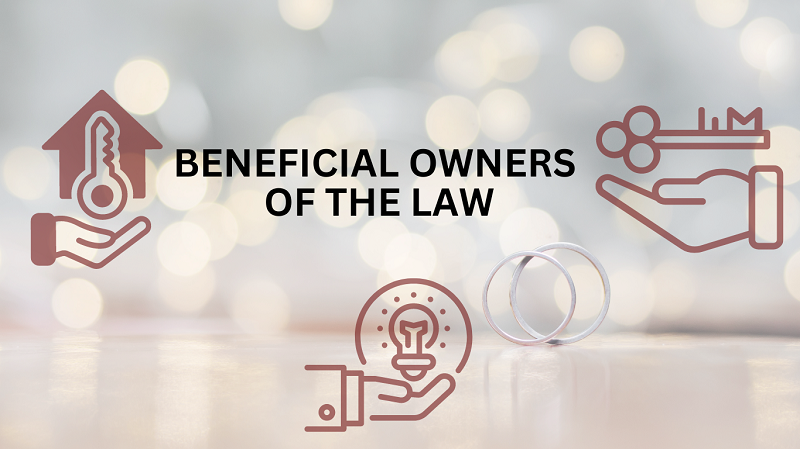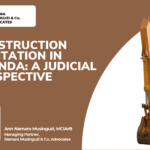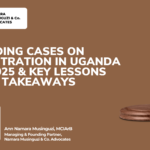Attention!
The Hon. Minister of Justice and Constitutional Affairs, Norbert Mao, on January 5, 2023 signed two new regulations— that is, The Companies (Beneficial Ownership) Regulations and The Partnership (Beneficial Owner) Regulations.These come into play to supplement the one law in place that governs money-laundering and streamline Ugandan laws with international anti-money laundering requirements.
Introduction
Before the year 2022, the only legislation on beneficial ownership in Uganda was the Anti-Money Laundering Act, 2013. In 2022, several amendment Bills were passed by the Parliament with provisions intended to strengthen and implement a system of sanctions on violations of “beneficial ownership.” This came as part of the corporate transparency in Uganda an area long overdue. Some of the amendments that guide on beneficial ownership passed in 2022 include but are not limited to: the Companies (Amendment) Act, 2022, the Partnership (Amendment) Act, 2022 and the Anti- Money Laundering (Amendment) Act, 2022. These acts introduced new provisions meant to combat financing of terrorism and such provisions include the provisions on beneficial owner. Uganda in 2016, adopted the Anti-Money Laundering/Combating the Financing of Terrorism (AML/CFT) Mutual Evaluation Report (MER). This Report highlighted several areas that needed to be addressed in Uganda’s AML/CFT legal and regulatory framework.
As a result of addressing such areas, Uganda would be complaint with the international beneficial ownership standards from the Financial Action Task Force (FATF) and the Eastern and Southern Africa Anti-Money Laundering Group (ESAAMLG) which have fed into national efforts to strengthen Beneficial Ownership (BO) transparency. In particular, Uganda would be complying with recommendations 24 and 25 from FATF which require Uganda to enact provisions to strengthen and implement the system of sanctions for violations of beneficial ownership transparencyobligations for legal arrangements.
Rationale for the laws on beneficial owners
Ugandan economy loses over UGX 2 trillion each year in illicit financial flows. This is as reported on July 12, 2022 in The Monitor by Scovia Bagwaneza. The figure is likely to even go higher given the global disparities. These illicit financial flows translate into missed developments opportunities, lost livelihoods and increased poverty. They also erode the resource base needed for larger infrastructure projects like mining and oil and gas exploration that can fully realise the potential of the Ugandan economy.
The main sources of illicit financial flows (IFFs) include corruption, money laundering, organized crime, trade mis-invoicing and tax evasion. Criminals and corrupt government officials use companies, and other types of legal entities like partnerships, corporative and trusts as vehicles to mask their identities and hide their illicit financial gains both in Uganda and across the world. The lack of information on the real owners of such entities therefore handicaps the Ugandan authorities and government at large to successfully track these criminal actors and recover value added tax.
Therefore, the legislations on “beneficial owners/beneficial ownership” comes into play to identify the individual who truly owns, controls, and economically benefits from a company or legal entity. This in term helps in unmasking criminals and curbing the use of anonymous companies as vehicles for illicit financial activities.
Who is a beneficial owner?
A ‘beneficial owner’ as defined under several amendment acts passed in 2022, including but not limited to, the Companies (Amendment) Act, 2022 and the Partnership (Amendment) Act, 2022 is a natural person who ultimately owns or controls a company, partnership, corporative or trust or the natural person on whose behalf a transaction is conducted in the partnership, and includes a natural person who exercises ultimate control over a company, partnership, comparative or trust.
The 2022 amendment acts amended several provisions of the existing legislations to provide for the definition of a beneficial owner and also require all legal entities to provide a register of beneficial owners that contains particulars of beneficial owners such as names, postal addresses, identification particulars and nature of the beneficial ownership. These registers are to be kept at URSB and the registered offices of the entity.
In addition to the already existing legislations on beneficial owners, the Hon. Minister of Justice and Constitutional Affairs, Norbert Mao, signed the Companies (Beneficial Ownership) Regulations and the Partnership (Beneficial Ownership) Regulations on January 5, 2023. These supplement the Companies (Beneficial Ownership) Act, 2022 and the Partnership (Beneficial Ownership) Act, 2022. These Regulations and their acts strengthen beneficial ownership transparency in Uganda since information in to be made available about who the real owners of the different entities are.
Concluding Observations.
As already highlighted, the requirement to submit beneficial ownership information are spread across multiple pieces of legislations in Uganda, all with different definitions for the term ‘beneficial owner’. Some of these legislations for instance, the Anti-Money Laundering Act, 2022 requires lawyers to collect beneficial ownership information on their clients on an ad-hoc basis. Uganda in 2020 joined the Extractive Industries Transparency Initiative (EITI) Standard, which requires a publicly available register of beneficial owners of corporate entities in the extractive
industry. This standard provides government and civil societies with new impetus to incorporate better beneficial ownership disclosures. Some Ugandan agencies, such as the Uganda Registration of Services Bureau (URSB) have taken administrative steps to capture beneficial ownership of companies.
All these steps and further enacted of various legislations on beneficial owners are vital steps towards curtailing the use of anonymous companies and other legal entities for illicit financial crimes. The beneficial owners register is key in providing effective use of and access to beneficial ownership data in a more-cost effective manner. These legislations also come in handy as they streamline customer due diligence process of the Anti-Money Laundering Entities and facilitates supervision by regulators over compliance with anti-money laundering obligations. These provisions make it easy for authorities to investigate and prevent the use of legal entities to hide illicit proceeds. In turn, this will improve Ugandan economy by eroding poverty and corruption.
Disclaimer: No information contained in this alert should be construed as legal advice from Namara Musinguzi & Co. Advocates or the individual authors, nor is it intended to be a substitute for legal counsel on any subject matter
Prepared By:
Ann Namara Musinguzi (Managing Partner)
ann@namaralaw.com
Ainomugisha Anita ( Legal Associate)
anita@namaralaw.com



